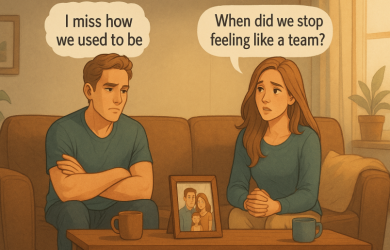Recognize 3 Key Signs of a Troubled Marriage

Key Takeaways
Marriage.com AI Quick Summary
It’s only natural for marriages to hit some rough spots, but some partners report being largely unhappy and disconnected from the marriage for years before they seek some form of help.
It can be a difficult thing to assess if the marriage is in trouble, especially if the level of meaningful communication is minimal. However, here are some general warning signs that your marriage may be in trouble.
1. Habitual low-mood interaction: Fighting, criticizing, & continual conflict
It is inevitable that two people will not see eye to eye on everything, so disagreements are common and healthy.
However, when conflict becomes the new normal, it is worth taking a step back to observe what is going on. It has become so common in our culture to project our own low-moods (anger, sadness, frustration, insecurity) onto others especially our loved ones, we never stop to question:
- If it really works this way that someone else could make us feel something?
- If there a better way to soothe ourselves and maintain good feelings in our primary relationship?
Habitual low-mood interaction can take many forms. It can manifest as continually fighting over the same things or even as an escalation of fighting that borders on verbally abusive (or even physically abusive). It also can show up in more subtle ways as constant criticism or attempts to change or control your partner’s behavior. It is ripe with judgement and obviously leads to a deterioration of good-will in the relationship.
If you are on this habit train, I encourage you to jump to a new track if you have any desire at all to make your marriage work.
2. Lack of connection
This also takes several forms. One of the most common issues that arises is that the couple put so much emphasis on the children that their relationship suffers. It often isn’t until the children are grown, that the couple realizes how far they have grown apart. When you stop spending time together or stop communicating, it only widens the feeling of separation.
Another tell-tale sign of possible trouble is lack of intimate connection. Lack of intimacy relates to a lack of touch, hand-holding, kissing, hugging, and sex.
In regards to sex, generally one partner has a higher sex drive. This in and of itself, is not a problem. The problem comes when that partner begins to feel rejected, isolated, unloved, and essentially disconnected from their lower sex drive partner.
3. Infidelity: Emotional and physical affairs (Fantasizing and actualizing)
There are many reasons why someone may choose to stray. Some reasons may be boredom, a longing for attention and affection, the excitement of risk-taking, and so on and so forth.
It is common sense that this is a sign of marital trouble. The affair may provide a boost of feel good chemicals like dopamine temporarily, but it will not transform the marital unhappiness, obviously.
This often makes things worst, eroding what little trust was already there. I have seen people cheat because they want to end things with their spouse and didn’t see another alternative as to how.
This may cause a problem for that person down the line. In states that have “fault” divorces, the act of infidelity increases the likelihood of being sued for damages and may leave that person at a disadvantage in the divorce settlement.
With that, disconnected marriages are not uncommon and there is nothing above means a couple is doomed and can’t fall back in love. I see this all the time in my work.
It is clear that as a culture, we need to take better care of one another and to listen more deeply.
Possible Solution:
Gain awareness into the inherent biases that every human being has. Learn the basics of how the brain functions.
I am not saying you need to become a neuroscientist, but learning how memory works for instance or the physical effects of rejection on the body is extremely useful because it allows you to come from a more neutral place in your interactions with your partner.
You will begin to see the innocence in your partner’s actions (and even your own).
It is common to try to fix your partner. However, this is unrealistic. You simply can not control or change another person. But, you can change yourself and that will change your level of happiness.
 Tips
Tips
Write your tip or submit a video tip
All tips are reviewed before the publishing.
Share this article on
Want to have a happier, healthier marriage?
If you feel disconnected or frustrated about the state of your marriage but want to avoid separation and/or divorce, the marriage.com course meant for married couples is an excellent resource to help you overcome the most challenging aspects of being married.
Related Articles
Recent Articles
Related Quizzes
Unlock Daily 30-Sec Tips for a Happier, Healthier Relationship
👉 Subscribe FREE on YouTube We'd love your feedback!
We'd love your feedback!
 Expert Q&A
Expert Q&A
Ask your question related to this topic & get the support you deserve from experts.



















 Thanks for your feedback!
Thanks for your feedback!